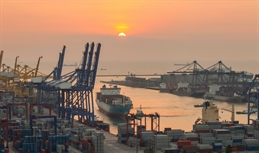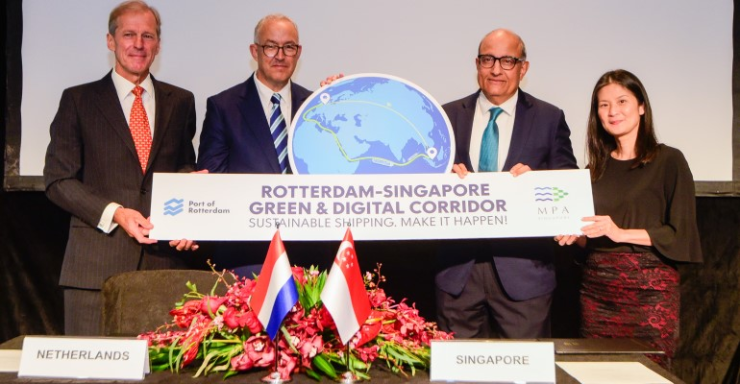
The Maritime and Port Authority of Singapore (MPA) and the Port of Rotterdam have signed a memorandum of understanding (MoU) to establish the world's longest Green and Digital Corridor in a bid to help achieve zero carbon shipping.
The MPA said in its announcement that the MoU will bring together stakeholders across the supply chain to realise the first sustainable vessels sailing on the route by 2027.
"Singapore and Rotterdam are among the largest bunkering ports in the world, making them vital links on the Asian-European shipping lanes. While international shipping currently uses largely marine gas oil (MGO) and low-sulphur fuel oil, sustainable alternatives such as biofuels, including biogases, are increasingly being made available," it added.
Looking into various kinds of alternative fuels
MPA said that other alternatives such as synthetic methane, hydrogen, and hydrogen-based fuels including ammonia and methanol are in various stages of R&D for future trials and deployment.
"Each alternative fuel has its own challenges relating to costs, availability, safety, and restrictions in range due to lower energy density compared to fossil fuels," it added.
"To tackle these challenges, the two port authorities agreed to bring together a broad coalition of shippers, fuel suppliers, and other companies to collectively work on potential solutions."
Beyond alternative fuels, the MoU also aims to optimise maritime efficiency, safety, and the transparent flow of goods by creating a digital trade lane where relevant data, electronic documentation, and standards are shared.
MPA noted that this will facilitate the seamless movement of vessels and cargo, and optimise the just-in-time arrival of vessels from port to port.

As part of the agreement, the port authorities noted that they will work with the Global Centre for Maritime Decarbonisation and the Mærsk Mc-Kinney Møller Center for Zero-Carbon Shipping as action partners, as well as other industry partners across the supply chain, including bp, CMA CGM, Digital Container Shipping Association, Maersk, MSC, Ocean Network Express, PSA International, and Shell for a start.
MPA said this will enable the Green and Digital Corridor project to raise investor confidence, attract green financing and kickstart joint bunkering pilots and trials for digitalisation and the use of low- and zero-carbon fuels along the route.
S Iswaran, minister for transport and minister-in-charge of trade relations, Singapore noted that decarbonising shipping is an "urgent climate action priority" which requires the collective efforts of the entire maritime sector.
"This MoU with the Port of Rotterdam demonstrates how like-minded partners can work together to complement the efforts of the IMO," S Iswaran added, noting that it will also serve as a valuable platform to pilot ideas that can be scaled up for more sustainable international shipping.
Allard Castelein, CEO of the Port of Rotterdam, pointed out that shipping is among the most important industries to decarbonise, owing to its large international reach and volume, which continues to grow.
"By bringing together parties across the supply chain along one of the world's biggest trade lanes, we can enable carriers to switch to zero-carbon fuels and speed up the transition to more sustainable shipping," Castelein said.
Quah Ley Hoon, chief executive of MPA, added that the MoU further strengthens the strong partnership between Singapore and Rotterdam.
"It reaffirms Singapore's commitment towards facilitating a multi-fuel bunkering transition as part of the Maritime Singapore Decarbonisation Blueprint 2050 and accelerates our digitalisation efforts to optimise maritime efficiency and improve supply chain resilience," Ley Hoon said.
The MPA chief added that the pilot will complement efforts undertaken by the shipping industry, including partners such as Google Cloud, and the IMO to support decarbonisation and digitalisation transition for international shipping in a bid to develop and scale up green and digital solutions for wider adoption.
Green shipping corridors
Last April, the United States unveiled a framework document pushing forward domestic and international green shipping corridors as part of its efforts to decarbonise maritime shipping in support of goals to achieve net zero emissions by 2050.
In November 2021, the US signed a declaration setting up green shipping corridors or zero-emission maritime routes between two or more ports along with 18 other countries to push shipping decarbonisation.
Last January, the Port of Los Angeles and Port of Shanghai created the first Transpacific green shipping corridor in one of the world's busiest container shipping routes.
Meanwhile, the plan to set up a Green Corridor between the Port of Rotterdam and Singapore was first announced last May.



